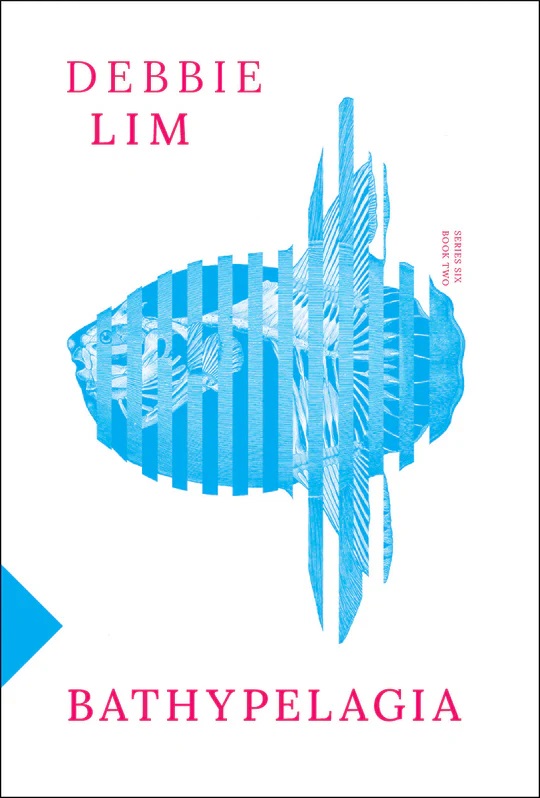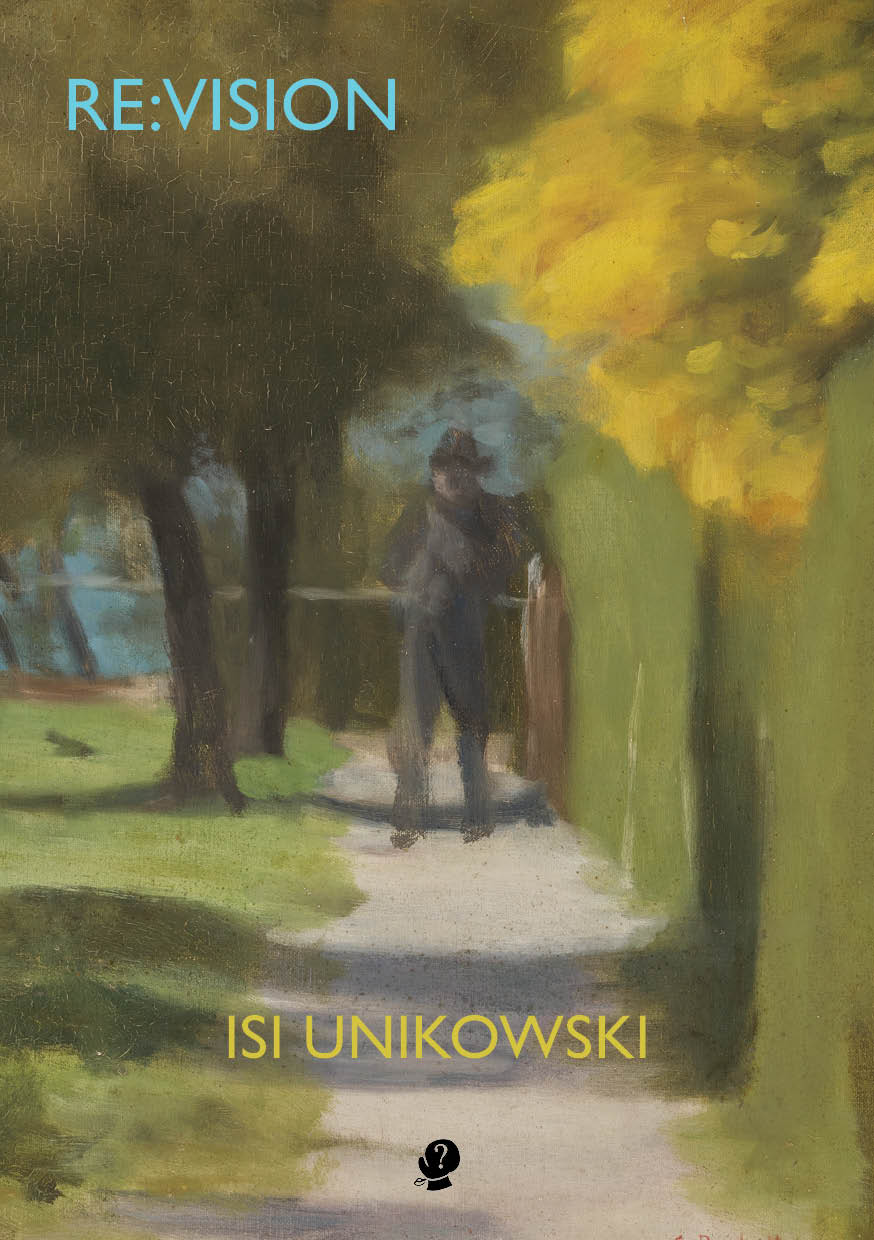
- Free Article: No
- Contents Category: Poetry
- Review Article: Yes
- Article Title: ‘Belling the vast dark’
- Article Subtitle: Two cartographic collections
- Online Only: No
- Custom Highlight Text:
The poems of Bathypelagia by Debbie Lim and Re:Vision by Isi Unikowski are poems of cartography; they map the unknown and probe the world with human curiosity, tracing meaning onto elusive places, feelings, and encounters, solidifying these through the writing process. Both collections conspire to understand the world as they construct their realities one line at a time, the poems themselves moving – in the former’s case, vertically from the deep sea, and, in the latter’s case, through the casting of light, the revealing of landscapes.
- Book 1 Title: Bathypelagia
- Book 1 Biblio: Cordite Books, $20 pb, 66 pp
- Book 1 Cover Small (400 x 600):

- Book 1 Cover (800 x 1200):

- Book 1 Readings Link: https://www.readings.com.au/product/9780645761665/bathypelagia--debbie-lim--2025--9780645761665#rac:jokjjzr6ly9m
- Book 2 Title: Re:Vision
- Book 2 Biblio: Puncher & Wattmann, $27 pb, 94 pp
- Book 2 Cover Small (400 x 600):

- Book 2 Cover (800 x 1200):

The bathypelagic zone is a deep-sea space that occupies the area between 1,000 and 4,000 metres below sea level. The creatures that live in this ‘midnight zone’ are alien-like: some have large mouths and elastic stomachs, others have reduced or no sight. The bathypelagic has typically been the site of the Other – an unknowable, uncanny plane, as otherworldly as Jupiter or Pandaemonium. As the narrator of H.P. Lovecraft’s ‘Dagon’ says, ‘I cannot think of the deep sea without shuddering at the nameless things that may at this very moment be crawling and floundering on its slimy bed.’
It is these nameless things that swim through the Titanic debris of Lim’s début collection, Bathypelagia. ‘Debris’ because Lim’s collection, at times, reads like a scientific catalogue of funky fish, a book that magnetises fragmented, imagistic poems about isolated animals into one interconnected collection. Lim inverts the alien trope of the deep sea, finding a human quality in these othered spaces. There is connection to be found in her chthonic ‘bathypelagia’ as the first poem, ‘Love Below 2000 Metres’, suggests with its twisted vitality: ‘the sour embrace of my mouth’s lonely trap – / then the cold slow fusing of our bloodstreams’.
Lim’s use of alliteration and assonance reveals a sensitivity for the auditory capabilities of poetry. Listen to, for example, the resonant repetition and tidal flow of ‘A faceless cusk alone in the corner / coddles his same beer’ (‘A Bar in Bathypelagia’), or the haunting sibilance of ‘sediment, the collapsed strata of years. / How many times has he raised those skulls with a minute brush, blown dust’ (‘The Fossil Maker’). These melodic frequencies create a humming sympathy for the outcasts of these poems: the eponymous ‘Fossil Maker’, or, as in one poem’s title, ‘My son the cephalopod’. Lim indulges in the sheer euphony of Latinate words, often using the scientific names for creatures as subtitles, or through the neologism of the collection’s title, ‘bathypelagia’. There is an animacy and intimacy to Lim’s othered world.
The imagistic, taxonomic poems in Bathypelagia delineate and define fauna, not least the short poems ‘Sea Horse’ and ‘The Vampire Squid’. They form a poetic understanding of the Other through classification, but also through an auditory understanding. The seahorse (hippocampus) is ‘Shaped like the mute section of the brain / that grips memory, the self in space’; the vampire squid (vampyroteuthis infernalis) is ‘Literally from hell. Belling the vast dark / with a cape of rusted tentacles. Dante drifting / red eyed’, but is, ‘like all elusive creatures – / maligned, misunderstood’. The symmetry of this last line, as well as its alliteration, ushers interconnectedness into the form of the poem. Bathypelagia transposes the aesthetics of the abyss and the aquatic into a world of human connection and understanding.
Conversely, to understand the world around him, Isi Unikowski looks to the parts of the whole, the functioning elements that can be revealed by envisaging and re-envisaging, as the title, Re:Vision, intimates. Many of the poems in Re:Vision are written through the lens of a poet as the witness to an object or action. In the case of the first poem in the collection, ‘Pumping station’, object and action are synonymous: ‘for all the size of these components, / there was an amenable logic / and purpose to the way rocking beams, cranks, rods’. The ‘I’ of ‘Pumping Station’ doesn’t appear until the fourth stanza, so dedicated is Unikowski’s speaker to the act of witnessing, to understandings the inner workings of machinery, ‘as though the parts of some celestial clockwork / had been dismantled and lined up’. There is a scientific wonder not dissimilar to Lim’s appreciation of flora and fauna. Such wonder has a revelatory and meditative power for Unikowski – the act of witnessing the fundamental motions of human creations is a sort of religious act. Unikowski poeticises the oft-forgotten analogue world.
In ‘Handwriting remembered’, Unikowski draws attention to writing as an intensely physical act. Handwriting is remembered ‘as plastic dripping-pens with cork grips and a blue callus on the middle finger’, the plosives jabbing the corporeality of writing home; Unikowski remembers handwriting ‘as the ache of disuse, the wrist-shackle’ that ‘allows the “e” to close, the “f” to curl inwards’. This writing of writing builds on Unikowski’s project to recognise the small mechanisms of a material, crafted world. In ‘The Tindinbilla Plates’ (after Fred Williams’s ‘Sherbrooke etchings’), Unikowski lays out the actions of creating an etching. These actions are revealed through light: ‘As I clear the detritus, light / advances in its trenches, as if to witness each incision / add ornament to the world. / Motion itself is the thought’. Later in the poem Unikowski writes, ‘I looked out, sight without frame / through rain compiling its index of the world’.
Re:Vision might be read as not only a compiled index of Unikowski’s world, but as a meditation on the act of complying, of having the world revealed to the poet through the nuances of light and the corporeality of movement and creation. As the speaker of ‘Cleaning windows’ says: ‘You’re working hard, mate, but you don’t labour well’. Unikowski’s poems labour between ideas, and it is in witnessing these simple movements, in their revelation through light and lines, that the reader can experience simple, harmonic moments.


Comments powered by CComment